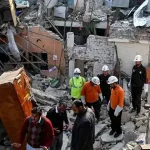UNITED NATIONS: Pakistan received 0.544 points, placing it 161st out of 191 nations on the UN Human Development Index, according to a study that was made public on Wednesday.
This represents a minor improvement over Pakistan’s 2023 rating of 164th with 0.540 points, three spots worse than its 2022 level. The 2022 study also mentioned that from 2019 to 2021, Pakistan’s HDI ranking stayed at 161st place worldwide.
A health index, an education index, and an income index are created using the indicators; each index has a value between 0 and 1.
With 0.782 points, Sri Lanka is the highest-ranked country in South Asia, ahead of Bangladesh (ranked 129th) with 0.661 points and India (ranked 132nd) with 0.633 points. Nepal comes in at number 143, while Afghanistan comes in last in the area at 180th place with 0.478 points—slightly higher than the ten lowest.
World is recovering from post-pandemic slowness, but the gap between affluent and poor states is growing, according to the UN Human Development Index.
Switzerland is placed first with 0.962 points, followed by Norway with 0.961 points. South Sudan is last on the list, coming in at 191st place with 0.385 points.
The world has recovered to pre-pandemic levels of development, but the research points out that this progress conceals a growing divide between affluent and poor nations.
The recovery comes after two years of decline, during which the worldwide Human Development Index (HDI) reversed five years of growth by declining twice in a row in 2021 and 2022—the first time this has happened since the index’s founding over 35 years ago. This was partly caused by the Covid-19 problem.
“We have witnessed a rebound after two years of actually reversing in terms of global human development with the pandemic and all its consequences,” UNDP chief Achim Steiner told AFP.
The projection for 2023 indicates that every category of metrics, including life expectancy, education, and standard of living, will surpass its pre-2019 values. However, the trajectory has been considerably dampened by the ongoing effects of the epidemic and the conflict in Ukraine.
However, the generally positive news obscures a widening gap between developed and developing nations.
The research, which looks at 2023’s progress, concludes that uneven development growth is aggravating inequality, pushing political polarization on a global scale, and leaving the poorest behind.
The UN sent a tweet stating, “The result is a dangerous gridlock that must be urgently tackled through collective action.”
“Rich countries experienced unprecedented development, yet half of the world’s poorest nations continue to languish,” the report also recognized.
A nation’s degree of prosperity is measured by the UN Human Development Index (HDI), which takes into account both economic and non-economic variables. Education level and life expectancy are examples of non-economic characteristics. Gross national income (GNI) per capita is a measure of economic parameters.
According to recent data, the United States has a high level of human development, with an HDI of 0.921. Even if this is a decent score, it is crucial to examine the larger picture by highlighting top performers globally and closely examining the index’s essential elements.
Five nations with extremely high scores are at the top of the HDI chart: Australia (0.951), Hong Kong (0.952), Norway, Iceland (0.959), Switzerland, and Hong Kong. They set the standard for ambitions of global development high, indicating an ideal balance of economic prosperity, educational attainment, and healthy life expectancy.
The fact that the US doesn’t rank in the top 10 suggests that improvements can still be made, especially in areas like health and education.
According to Mr. Steiner, “the report’s widening human development gap demonstrates that the two-decade trend of steadily reducing inequalities between wealthy and poor nations is now in reverse.”
We are failing in spite of our extremely interwoven global communities. He continued, pointing out that there is a substantial human cost hidden behind the statistics. “We must leverage our interdependence as well as our capacities to address our shared and existential challenges and ensure people’s aspirations are met.”
In addition to impeding human growth, the inability of collective action to address issues like poverty, inequality, digitalization, and climate change exacerbates polarization and undermines confidence in people and institutions across the globe.
A growing “democracy paradox” was also noted in the report, as the majority of respondents said they supported democracy but also endorsed leaders who would compromise democratic ideals.
This contradiction has fostered political polarization and inward-looking policy initiatives, along with a sense of helplessness and a lack of control over decisions made by the government.








